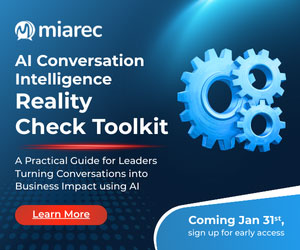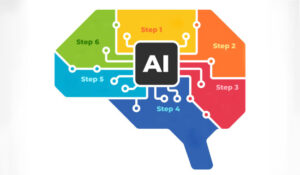Gennadiy Bezko at MiaRec explains the contact centre AI Maturity Model, enabling you to precisely understand your current AI maturity level and identify the next steps to advance your maturity.
Hundreds of contact centre managers and Directors of Operations from mid-sized to large organizations are spoken with every year.
While they each face slightly different challenges (based on the industry they are in or the level of AI adoption they have already achieved), most of them share a common frustration. Those conversations sound something like this:
“We have invested in three different AI tools in the past 12 months, but they don’t talk to each other, our data is scattered across platforms, and frankly, I’m not sure we are getting the ROI we expected.”
And the data backs up what we’re seeing in the field: while 96% of contact centres view AI as essential to their operations, between 70% and 85% of AI initiatives fail to meet their expected outcomes-almost double the failure rate of traditional IT projects.
The AI Implementation Paradox
Contact Centre AI has never been more powerful or accessible, yet the path to successful implementation remains frustratingly complex.
Directors of Operations and Contact Centre Managers often find themselves overwhelmed by vendor pitches, each promising to be the silver bullet. The result? A patchwork of point solutions that create more problems than they solve.
The Hidden Costs Of Fragmented Contact Centre AI Adoption:
This is seen to often: A contact centre decides to “go AI” and implements solutions in whatever order seems most exciting or urgent.
They start with an AI agent assist tool because agents are struggling, add a chatbot because competitors have one, then realize they need better analytics and bolt on a Business Intelligence platform.
This causes a lot of headaches, for example:
Siloed Data Prevents Holistic Insights
Without complete call recording, transcription, and automated scoring as your foundation, your agent assist tool is making recommendations based on incomplete information.
Your Conversation Intelligence dashboard is beautiful, but tells you nothing meaningful because it’s missing 60% of your interaction data.
Lack of Integration Drains IT Resources
Some contact centres spend months and a significant amount of money trying to connect their different systems, simply because they built it backwards, instead of establishing a unified data layer first.
Agent Confusion From Multiple, Disconnected Systems
Your expensive new coaching platform can’t identify patterns or improvement opportunities because your QA process is still manual, evaluating only 2% of interactions. You’re trying to coach from a statistical sample when AI could analyze 100% of conversations.
Compliance Blindspot
When you layer AI tools without establishing proper data governance first, you create regulatory vulnerabilities.
I’ve seen operations discover they were storing customer data in seven different places across five vendors, a compliance officer’s worst nightmare.
The pattern is always the same: contact centers end up spending more time managing their fragmented AI ecosystem than benefiting from it.
They achieve some gains in each isolated area, but miss the exponential compounding value that comes from building systematically.
After working with hundreds of contact centres and witnessing both spectacular successes and costly missteps, we recognized the need for a different approach. Not another AI tool, but a strategic framework that brings order to the chaos.
Introducing The Contact Centre AI Maturity Model
The Contact Centre AI Maturity Model isn’t just another framework, it’s a tried-and-true roadmap built from real-world experience.
It addresses the fundamental question every contact centre leader faces: “Where do I start, and how do I build sustainably?”
This six-layer model transforms the overwhelming landscape of AI possibilities into a clear, sequential journey. Each layer builds upon the previous one, ensuring you create a solid foundation before advancing to more sophisticated capabilities.
Why This Matters For Your Operation:
- Eliminates guesswork in AI tool selection and sequencing
- Prevents costly integration failures through systematic building
- Maximizes ROI by ensuring each investment amplifies the others
- Creates unified data lakes that power advanced analytics
- Provides clear success metrics for each stage of your journey
Think of it as your GPS for AI transformation, showing you exactly where you are, where you’re going, and the optimal route to get there.
Your Journey Through the Six Maturity Layers
Layer 1: Automate – Building Your Foundation
Goal: Streamline repetitive tasks and scale quality assurance without increasing headcount.
It’s not the most visible part of our work, but it’s absolutely essential. Layer 1 focuses on converting every conversation into structured, accessible data while automating your most time-consuming manual processes.
Capabilities:
- Automated QA that evaluates 100% of interactions
- AI-powered self-service tools that deflect routine requests
- Smart routing based on intent and sentiment
- Complete speech-to-text transcription
- Automated data redaction for compliance
Real-world example: Advantage Reserve, a hospitality contact centre, transitioned from manually evaluating only 10% of its 50,000+ monthly calls to automated QA, covering 100% of relevant interactions.
Within months, they eliminated their outsourced QA vendor, saved over 800 hours annually, and saw agent performance scores improve from 73% to 85%.
Most importantly, they eliminated the incomplete transactions that were occurring up to 10 times per month, fixing process issues they couldn’t even see before.
When to advance: Your automated systems are reliable across all channels, and leadership is asking for insights beyond basic automation.
Layer 2: Augment – Empowering Your Agents
Goal: Improve agent performance and customer experience with real-time intelligence.
Now the magic begins. Layer 2 puts AI directly into your agents’ workflows, providing instant guidance, automated summaries, and live sentiment detection.
Capabilities:
- Real-time agent assists with prompts and next-best actions
- Automatic call summaries and categorization
- Live sentiment detection with escalation triggers
- AI-powered knowledge base updates
- Supervisor dashboards with instant insights
- Automatic Coaching
Real-world example: isp.net, a Las Vegas-based Internet Service Provider, replaced manual call evaluations with automated quality assurance.
To improve agent performance and overall customer experience, the company implemented automated coaching. Their agents now receive personalized feedback after every call, enabling them to self-correct and continue improving.
The system automatically flags calls with negative sentiment, allowing managers to deliver targeted coaching within the same day rather than waiting for random sampling to surface issues. The result: 42% improvement in NPS scores and 900% increase in visibility across the organization.
When to advance: Agents rely on AI assistance daily, and you’re ready to move beyond “what happened” to understand “why it happens.”
Layer 3: Analyze – Extracting Strategic Insights
Goal: Transform conversation data into actionable CX insights using AI-powered analytics.
This is where your data investment pays dividends. Layer 3 generates survey-free CX metrics, identifies root causes, and reveals patterns that drive strategic decisions.
Capabilities:
- Predictive CSAT, NPS, and sentiment scoring
- Voice of Customer trend analysis
- Root-cause identification for repeat issues
- Automated compliance and risk monitoring
- Churn and revenue opportunity detection
Example: A financial services firm uses Contact Centre AI analytics to discover that 40% of their “billing inquiry” calls happened due to confusion about a new fee structure.
Rather than training agents to handle calls more effectively, they simplified fee communication. We have seen examples where the call volume significantly dropped and customer sentiment was drastically improved.
When to advance: Teams actively use insights to drive improvements, and leadership wants these metrics integrated into broader business intelligence.
Layer 4: Transform – Driving Enterprise-Wide Impact
Goal: Integrate conversation insights into company-wide strategic decisions.
Layer 4 breaks down silos, connecting your contact centre data to marketing, product development, sales, and executive decision-making.
Capabilities:
- Direct BI and CRM system connections
- Shared KPIs across departments
- AI-driven personalized coaching plans
- Product feedback loops to development teams
- Revenue attribution from conversation data
Example: A software company discovers, thanks to conversation insights, that their top churn driver wasn’t pricing, it was confusion during the onboarding process.
This insight led Product to redesign their user experience, Marketing to adjust messaging, and Support to create proactive outreach campaigns. We have seen companies reduce first-year churn up to 30%.
When to advance: Multiple departments use conversation data weekly, and leadership seeks predictive insights rather than historical reports.
Layer 5: Predict & Prescribe – Anticipating the Future
Goal: Use AI to forecast outcomes and prescribe specific actions before problems occur.
The pinnacle of contact centre AI maturity. Layer 5 doesn’t just tell you what happened, it predicts what’s coming and recommends exactly what to do about it.
Capabilities:
- Churn and satisfaction forecasting
- Proactive coaching recommendations
- Revenue opportunity detection
- Ask-AI natural language insights
- Automated prescription of corrective actions
Example: An e-commerce company utilizes AI-driven Business Intelligence insights and recommendations to identify customers likely to churn, based on their conversation patterns.
The proactive retention team reached out with personalized offers, saving a significant number of at-risk accounts and generating millions in retained revenue over six months.
Layer 6: Orchestrate – Autonomous, Goal-Driven AI Operations
Goal: Enable AI to execute multi-step actions across systems to achieve defined business outcomes with minimal human oversight.
Capabilities:
- AI-initiated workflow automation across CRM, billing, scheduling, and ticketing.
- Dynamic task decomposition and prioritization.
- Human-in-the-loop guardrails for compliance and exception handling.
- Continuous self-improvement based on outcome feedback.
Example: An AI agent detects a high-value customer at risk of churn, autonomously adjusts their plan, sends a personalized message, and updates CRM, all without a manager triggering the workflow.
Assess Your Current Maturity
Now, where do you start? The Contact Centre Maturity Model is only part of the journey. It shows you your goal and the way to get there.
However, understanding your current position is crucial for planning your AI journey effectively. To get started, you still need to know your starting point.
This blog post has been re-published by kind permission of MiaRec – View the Original Article
For more information about MiaRec - visit the MiaRec Website
Call Centre Helper is not responsible for the content of these guest blog posts. The opinions expressed in this article are those of the author, and do not necessarily reflect those of Call Centre Helper.
Author: MiaRec
Reviewed by: Megan Jones
Published On: 18th Aug 2025
Read more about - Guest Blogs, MiaRec






 MiaRec is a global provider of Conversation Intelligence and Auto QA solutions, helping contact centers save time and cost through AI-based automation and customer-driven business intelligence.
MiaRec is a global provider of Conversation Intelligence and Auto QA solutions, helping contact centers save time and cost through AI-based automation and customer-driven business intelligence. 









